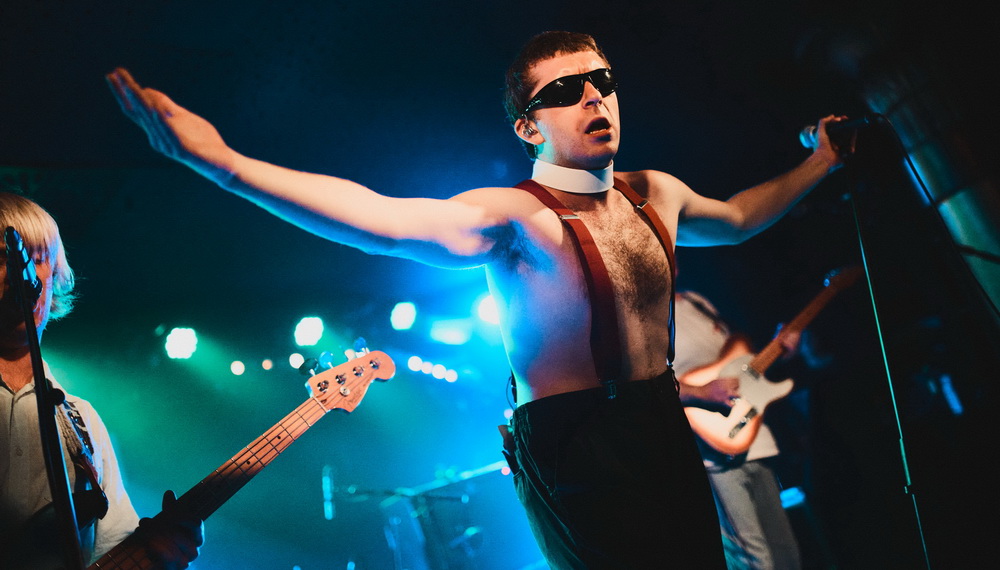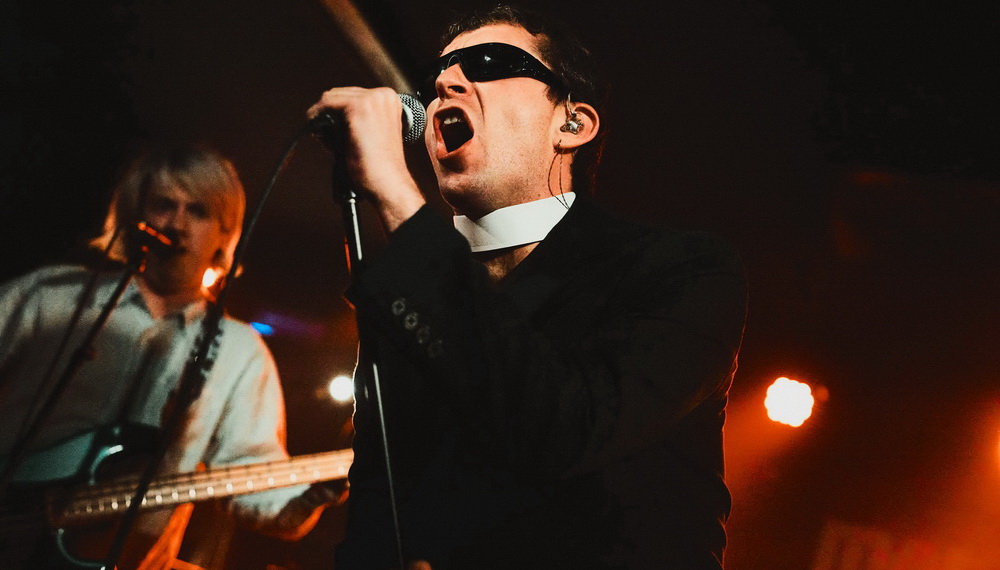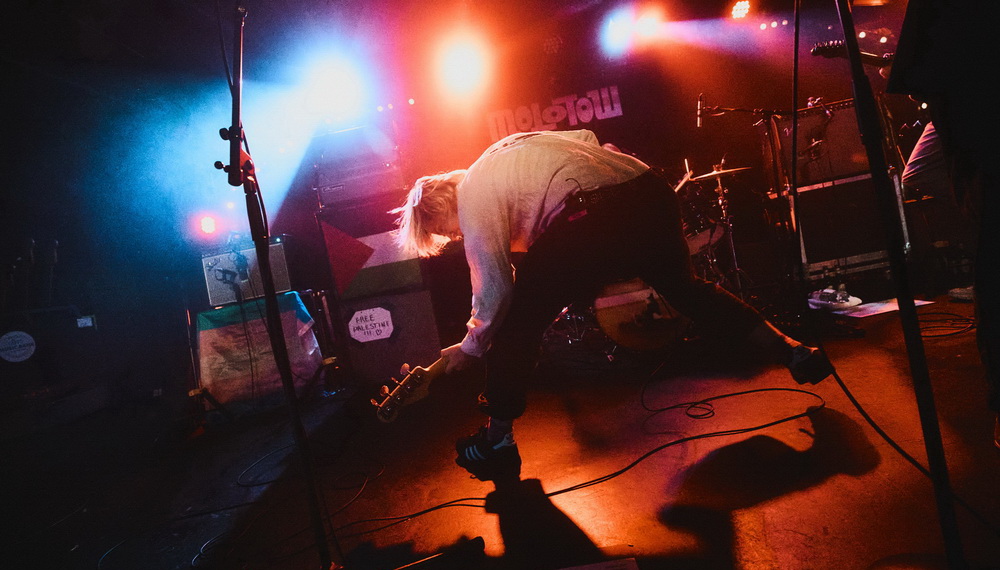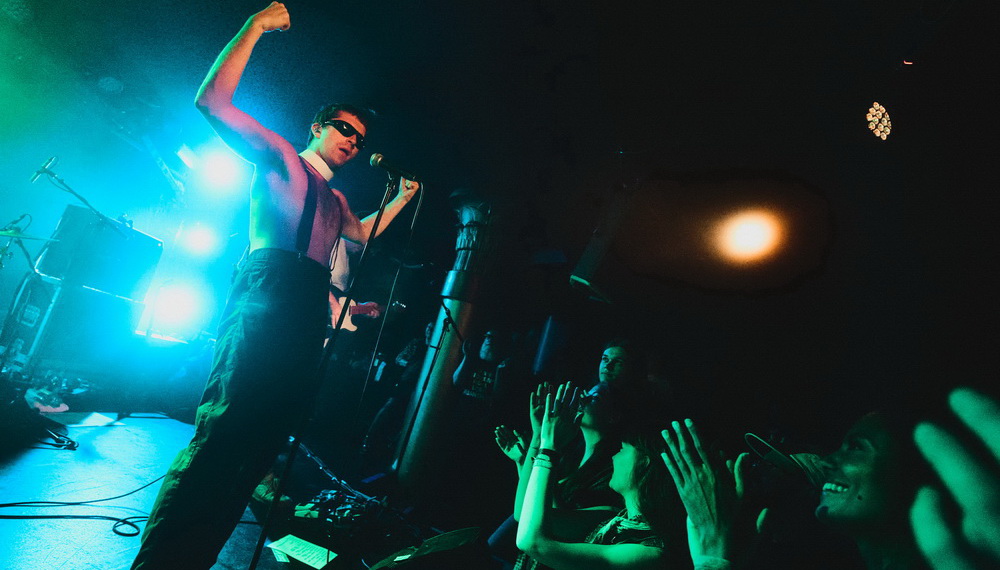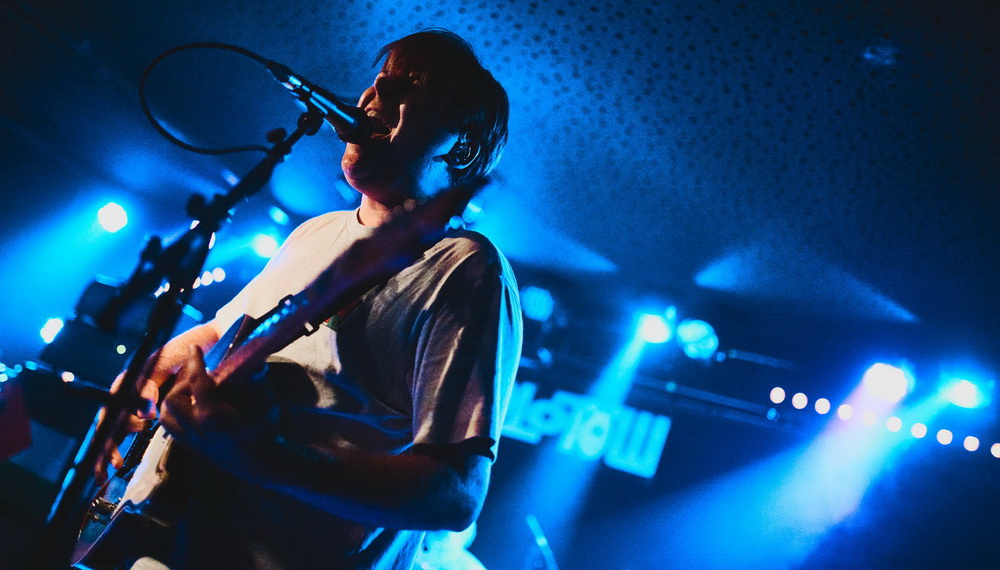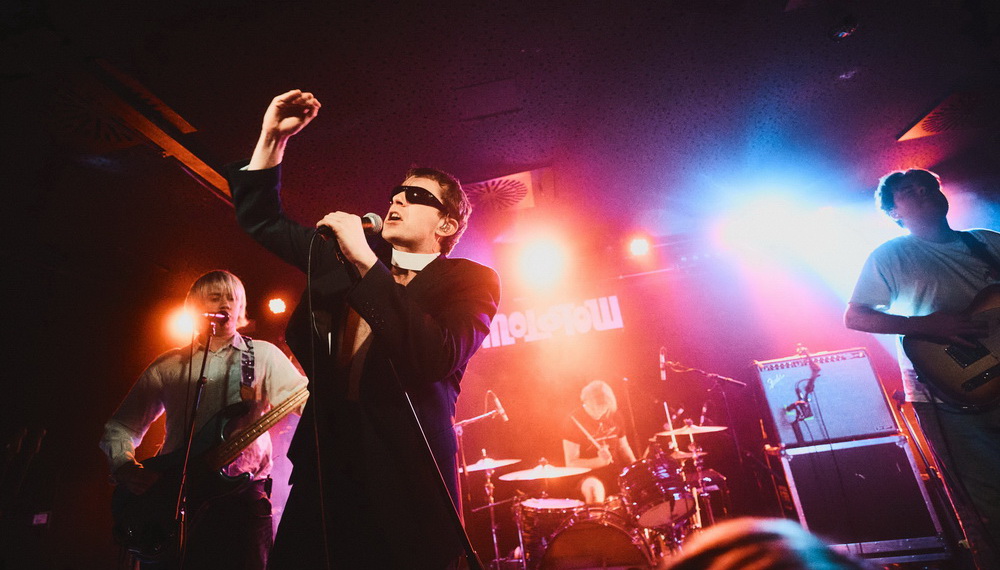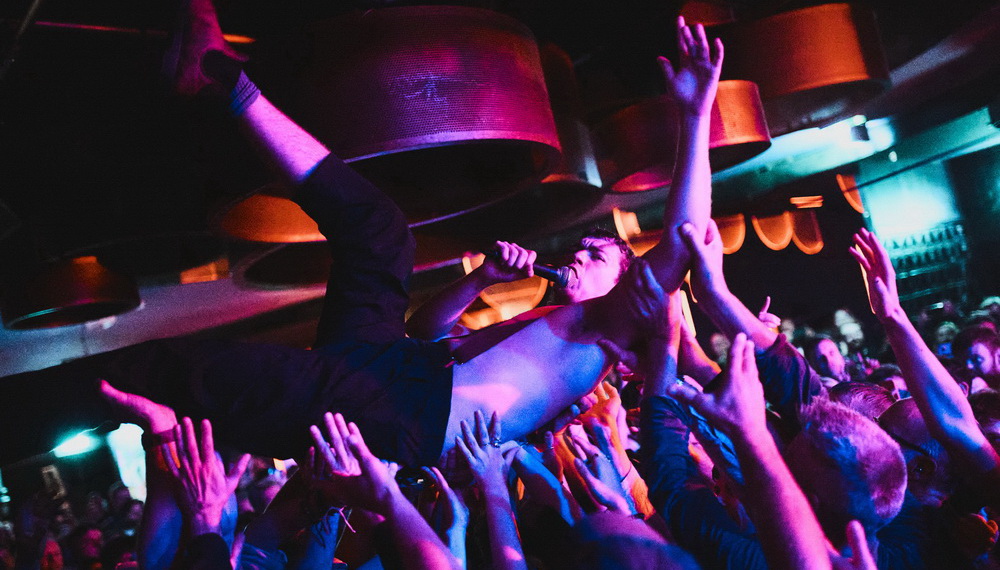Back in the days when I still lived in the UK, I frequently headed off to London to watch new bands as soon as friends would text me one of those ‘you really got to see this band’ messages. Most of those gigs were quite disappointing, but I’ve discovered bands that have stayed with me ever since I saw them at some small underground club or a pub with a small stage in the corner (bands like Yonaka, Sprints, The Reytons, and a few more).
One beer-heavy night in 2015, we ended up at the New Cross Inn to watch a band that my friend described as ‘maniacs on stage’, and that band was South London five-piece Shame.
The band – frontman Charlie Steen, guitarists Sean Coyle‑Smith and Eddie Green, bassist Josh Finerty, and drummer Charlie Forbes – emerged from the sweat-soaked scene of south London’s pubs and grassroots venues about a year before that night at New Cross Inn. At the core of their sound is introspective textures of post punk coated in Steen’s rough-edged vocals and social commentaries, and in a sonic landscape crowded with post-punk revivalists, Shame stand apart through their balance of chaos and control.
Their first full-length, Songs Of Praise, landed with a loud bang in 2018 and drew accolades among fans and critics, and they built a reputation through chaotic shows, making the battle of Hastings look like two kids fighting in the sandpit. Shame became the beacon of a new era of bands that took live performances to the next level – organized chaos.
Today, seven years after Songs Of Praise, they’ve just released their fourth album, Cutthroat, and embarked on a tour across Europe. When the band stopped off at Molotow in Hamburg, we sat down with Charlie, Sean, and Josh for a chat about working with John Congleton on Cutthroat, picking up Oscar Wilde’s Dorian Gray as inspiration for the lyrics, and what the next Shame decade will look like.
A decade of Shame
It’s fun to sit here with you today; it’s been kind of a long ride since I saw you the first time at the New Cross Inn in London in 2015.
I lived in Bristol at the time and used to go up to London to watch new bands on the weekends, and a friend told me that I had to come out for this new band, and that was you.
Wait, you were there then? Fucking hell! That was ten years ago, incredible! It was like a student bar back then.
Today, it’s a big hardcore scene; all the hardcore bands play there. Our friend from Poison Ruïn played there recently, and every hardcore night has like eleven bands playing for three or four hours.
If you reflect a bit, you’ve stayed together as a band for more than a decade. What kept you together through ten years, multiple tours, and four albums? Many bands release a few EPs and a debut album and then vanish again. What’s your secret?
I don’t know. I mean, during the first few years we were still in school, and then – was it seven years ago? – we put out the first album. And through that, it’s been Covid and touring all over the place for more than two years. We’ve had our bumps and hurdles like every group would have, but I think we just all know each other very well and what we want to do. We’ve all gotten older and sort of established what we are as individuals and people.
Our lives have changed, but the band has always been a constant. There’s always something that we’ve managed to work around, and that remains the same. Even though our interests and lifestyles and everything outside of what we do as a band have changed, the band has always been something that’s there because it’s our job.
Four albums, four producers
Working with different producers for every album has been an intentional part of Shame’s career. On the last album, Food For Worms, Depeche Mode’s old mastermind, Flood, was carrying the producer torch through the recording process, and for Cutthroat, it was time for another change in sound.
Grammy-winning producer John Congleton, known for his work with a wide range of artists including St. Vincent, Explosions in the Sky, and, recently, Scottish noisemakers Mogwai, has been a fan of the band for a while, but it wasn’t until Cutthroat that schedules finally lined up and made a collaboration possible. And it had an impact on the band’s work methods in the studio.
Let’s talk a bit about your new album. Cutthroat came out about a month ago, and you worked with one of my favorite producers, John Gongleton, who has produced some fantastic albums for bands like Mogwai and This Will Destroy You a few years ago. But he has a wide range, from working with post-rock bands to pop artists. How come you hooked up with him for Cutthroat?
He’s been kind of on our radar for a number of years, actually. We had conversations with him about doing previous records, but, you know, schedules and that sort of thing didn’t quite line up. John’s always vocally been a fan of the band. So, when the opportunity came around to work with him, it felt like a natural decision for us to make.
We had a couple of meetings with him over Zoom because he’s based over in L.A., and when he was in London, we had a chat with him at a pub in Brixton, and thought, ‘Okay, this is going to work out quite nicely’. So, we managed to drag him over to Brighton and rainy December to do the record at a great studio called Salvation. And it felt like we were very much able to just be honest with him. He was honest with us, and very big on trust. That was sort of a fundamental part of the process. I mean, he was definitely brutally honest with us on a number of occasions, but everyone felt comfortable with him. He’s very good at navigating five different creative personalities in one room.
I know he has a reputation for having a very direct approach in the studio, not taking any bullshit. Were there moments when you disagreed with him about taking a particular direction on a song?
He would never be like, ‘I think that section sucks’ or stuff like that. It was the difference between, like, knowing what the small stuff is and what the big stuff is, if you know what I mean? He was very good at that, like small things that you can really stress over and hyperfixate on. He was just like, ‘It doesn’t matter, it sounds good either way’.
But then, on the fundamental levels of some of the songs, he was like, ‘Look, what is this song? What is it about?’. He just wanted an explanation of things, and that was very important in finding the identity of the songs. If there was a clear explanation, he would back it.
But yeah, he was cut for it, cut for this album.
I read that you wanted to ‘cut the bullshit out and streamline everything’ on the record. But did that also mean you had to leave out things and be tougher in decisions on what to keep? How did you go about it? For example, were there ideas or parts you dropped because of it?
That did happen on a couple of songs. Like “Screwdriver”, which was probably triple the length. It was similar with “Plaster”; we had a massive ending for that one, and we had those conversations with John, but he was very transparent in saying, ‘Look, if you really believe in this and you want me to believe in it, convince me and I’ll believe in it and we’ll proceed’.
I imagine he changes his approach for different bands that he works for. But we also gave him the license to be like that, and maybe that made him do it less. All of us seemed to be on the same page the whole time. There weren’t any big arguments, you know, and there was nothing that we were devastated to leave behind. It all felt like it made sense.
But how are you as a band in the studio? Cutthroat is your fourth album, and I guess you know what you want when you go into the studio today, and maybe you want to be more in control based on the experience you have. Or do you trust your producers fully that they are right when they make decisions about songs?
That’s kind of how we choose them, really. It has to be a very trust-based process; that’s a huge part of how we choose who to work with.
What’s also interesting is the theme of the album and your reference to Oscar Wilde. My first semester at the university, I studied literature and came across Oscar Wilde and The Picture of Dorian Gray. I saw that you, Charlie, in an earlier interview this year, pointed out that it’s a theme on the album. In what way have paradoxes and contradictions influenced the album?
I would say like half of the album in terms and songs. “Lampião”, “Screwdriver”, “Axis of Evil”, “Plasters”, and a few more are definitely on the theme. I just thought it was really interesting because I was interested in conflicted characters. I mean, I think I’ve been saying, like, on the very basic level of popular culture, there are characters like Tony Sopranos or the gangster who goes to church, or the socialite who takes cocaine, if you know what I mean? These kinds of contradictions are very omnipresent, and I found that interesting.
But is starting with a theme something you have done for all your albums, or is it a new process for you?
I think the first one (Songs of Praise) was a lot more similar to this. It was quite a lot of social commentary and stuff like that. And then, on the second (Drunk Tank Pink) and third album (Food For Worms), it was maybe more internal. The third one, for me, was not very clear because it was sort of written in a short period of time.
For this one, I wrote a lot of the lyrics in the studio for the first time, which I actually think was very good to do because it’s what the album needed. It makes it more concise, and it makes the themes throughout a bit more clear.
If I’d been there for a little while longer, maybe some lyrics would have been different, but it was good just doing it in this way because you sort of can make it concise again. You know, when John was talking about ‘What’s the song about?’ and stuff like that, I was like ‘I don’t want to get to interviews and say it’s open to interpretation’. If you can find the meaning that you’re trying to write, then you could be able to sing. So, I really enjoyed it and the whole process of writing them all in the studio.
And also, if I’m thinking about someone to write about, it makes it easier.
And the rest of the band can chip in a few words and contribute?
Probably not (laughs). It’s not like that at all. Sean has his lyrics in “Spartak” and Josh came up with the flat Earth line for “Nothing Better”.
We can say what we want, but Charlie can do what he wants, and it’s fine. We’ll stick to the strings and the drums, but there’s a lot of contribution to the lyrics. So, when we do the credits on the album, it says music and lyrics by Shame because it does have an effect – everyone contributes.
Considering the way we did this album, maybe apart from the first album, it’s my favorite recording we’ve done, maybe even more so than the first album because it just felt like work in the best way with no distractions. It was the middle of December, when it’s usually the biggest party month of the year. But instead, we’re in this shithole with no distractions and rain, and an American complaining about the weather all the time. And it was really fun. (laughs)
With each record, you have found new ways to sharpen your edge. Is changing producers for every album how to keep the edge, like letting Congleton in and adding some more noise to the music?
He’s a really talented producer as well and didn’t overproduce. Every producer we’ve worked with, we’re very proud of what they’ve done. It’s good having someone coming in fresh, you know. Maybe that was a big part of why we felt so good.
We started out so young, which in so many ways are so beneficial and so fortunate, and it feels like you’ve learned so much already and just want to keep going.
So, to wrap it up, the first decade is done. What’s left for you to explore for the next decade?
The Eras tour. Shame The Eras Tour.
*****
Photographer: Julia Schwendner
*****
Shame pages
 Messed!Up
Messed!Up
